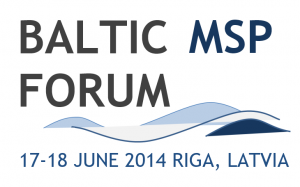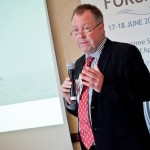 Workshop: e-MSP – Data needs for proper maritime planning
Workshop: e-MSP – Data needs for proper maritime planning
Moderator: Manuel Frias Vega, HELCOM Secretariat
Presentations
- Bettina Käppeler, German Federal Maritime and Hydrographic Agency:Results of the PartiSEApate Stakeholder WS on MSP Data / Data Network and recommendations for a subgroup on MSP Data and Data Network under the HELCOM/VASAB MSP WG - download
- Jens Peter Weiss Hartmann, Danish Geodata Agency, Chairman of the Marine Spatial Data Infrastructure Working Group of the International Hydrographic Organization, Chairman of the MSDI Working Group of the Baltic Sea Hydrographic Commission:Marine spatial data infrastructure and sea basin cooperation - download
- Jens Perus, Centre for Economic Development, Transport and Environment of Southern Ostrobothnia: SeaGIS. Cooperation for ecosystem based planning of the marineenvironment using GIS - download
- Fabio Ballini, Maritime Environmental Research Group, World Maritime University: Maritime Spatial Planning considerations in the MONALISA 2.0 project – download
- Dainis Jakovels, Institute for Environmental Solutions, Latvia: Application of hyperspectral airborne remote sensing for marine ecosystem monitoring – download
- Alessandro Pititto, COGEA srl: EMODnet. The European Maritime Observation and Data Network - download
Workshop summary
Implementation of the Integrated Maritime Policy (IMP) provoked changes in the water management of European countries. While MSP is a strong tool for implementing IMP it is a quite recent concept and still under development. Data management is one corner stone of MSP and was the subject of this session.
 The main challenge of organising MSP processes within a transnational environment is access to validated, up-to-date, and comparable data. Thus many multi-level issues need to be solved within the European maritime framework. Creating a common European data space, harmonization and standardization of operating data as well as filling gaps are just a few of examples.
The main challenge of organising MSP processes within a transnational environment is access to validated, up-to-date, and comparable data. Thus many multi-level issues need to be solved within the European maritime framework. Creating a common European data space, harmonization and standardization of operating data as well as filling gaps are just a few of examples.
Optimal framing of Maritime Spatial Data Infrastructure (MSDI) at international, regional and local perspective was the main subject of the working section. The presenters were focused on the assessment of contributions from data agencies from around the Baltic Sea as well as from other European institutions. EMODnet (European maritime observation and data network) is a network of organisations that follows the vision of free access to interoperable data layers and data products within Europe. According to EMODnet the amount of existing data is sufficient. That is why EMODnet is, currently, mainly concerned with harmonization of data and creating a comparable data environment.
 In the course of the PartiSEApate project recommendations for setting up a pan-Baltic Spatial Data Infrastructure have been worked out. There is a strong need for metadata to ensure data significance and reliability. As there are nine countries around Baltic Sea the implementation of data standards is important to allow for an unobstructed sharing and exchange of data. At the same time, an assessment of available data and data needs as well as the definition of gaps (basically with regard to relevant socio-economic and cultural data) are crucial to reach the aforementioned goals. A data infrastructure would not only create freely accessible datasets, but also strengthen SDI with relevant web services, agreements and organization. As mentioned in the presentation on the Danish case of MSDI preparation, the main drivers for up-to-date data in MSP are increased need for coordination within MSP, land-based planning as well as coordination among neighboring countries.
In the course of the PartiSEApate project recommendations for setting up a pan-Baltic Spatial Data Infrastructure have been worked out. There is a strong need for metadata to ensure data significance and reliability. As there are nine countries around Baltic Sea the implementation of data standards is important to allow for an unobstructed sharing and exchange of data. At the same time, an assessment of available data and data needs as well as the definition of gaps (basically with regard to relevant socio-economic and cultural data) are crucial to reach the aforementioned goals. A data infrastructure would not only create freely accessible datasets, but also strengthen SDI with relevant web services, agreements and organization. As mentioned in the presentation on the Danish case of MSDI preparation, the main drivers for up-to-date data in MSP are increased need for coordination within MSP, land-based planning as well as coordination among neighboring countries.
Subsequently, the focus of discussion was turned to the local level. Recent local experience of creating MSDI in the Quark region showed the similarity of challenges to regional data infrastructure development. The SeaGIS project aim at establishing a “1-stop-shop” for available data. The project Monalisa 2.0 is an example of improving data availability in the shipping sector. Monalisa 2.0. worked on dynamic route planning for ships. Advantages of this tested instrument are the more efficient use of space by ships, saving fuel and reduced emissions. Another innovative approach to improve data availability is airborne remote sensing, which inter alia helps to collect data on bird migration as well as to monitor the distribution of hazardous substances.
Video recording
Part 1
Part 2
Part 3
Part 4

